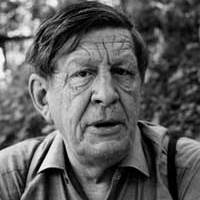The Unknown Citizen by W.H. Auden: Summary and Analysis
The Unknown Citizen, first published in the Listener on August 1939, and later included in the Collected Shorter Poems, 1950, is a satire, not on the citizen, but on the way in which the average man in the street is controlled by the conventions of bureaucracy and the Welfare State which ignore the need for a man to be free and happy.

W.H. Auden (1907-1973)
In this poem Auden shows that poverty and totalitarian regimes are not the only enemies of freedom. Human freedom is restricted in subtle ways in the so-called free capitalist states as well. The average modern man in a mercantile society is ridden heavily by the more of technocratic, bureaucratic and other regimented establishments.
The Unknown Citizen, has no name; he has only a number, to whom the monument has been built and has been found to be without any fault. He was a saint not because he searched for God but because he served the government perfectly. He did not get dismissed from his job. He was a member of the Union and paid all his dues to the union. A report by the Union shows that it was a balance union and did not take extreme views on anything. The social psychology workers found that he was popular among his fellow workers and had a drink with them now and then. He also bought a newspaper every day. He reached to the advertisements normally.
He had good health and although he went to the hospital once, he came out quite cured. The citizen was sensible about buying things on an installment basis. He had everything a modern man needed at home. Moreover, this ideal citizen was found to be sensible in his view. When there was peace, he supported it. But when there was war, he was ready to fight. He didn’t hold his personal views on anything. He had the right number of children and he did not quarrel with the education they got.
Many European governments of that time resorted to dictatorship of some kind or another and the individualism of general citizen was at stake. The average citizen was made absolutely conformist. He had been distorted into a totally dictated harmless mechanism. Everything about him could be understood in some kind of statistical formula put out by the government or its agencies. He had surrendered his individuality and was often identified by a number rather than personality features which were of course common to all citizens. The poet now asks the important questions. Was this man free? Was he happy? No government statistics can ever answer these kinds of questions.
The Unknown Citizen is a typical Auden’s poem in that it shows the poet’s profound concern for the modern world and its problems. A keen, intelligent observer of the contemporary scene, Auden was one of the first to realize that the totalitarian socialist state would be no Utopia and that man there would be reduced to the position of a cog in the wheel. A citizen will have no scope to develop his initiative or to assert his individuality. He will be made to conform to the State in all things. It is the picture of such a citizen, in a way similar to Eliot’s Hollow Men, which is ironically presented in the poem. Auden dramatizes his theme by showing the glaring disparity between the complete statistical information about the citizen compiled by the State and the sad inadequacy of the judgments made about him. The poet seems to say, statistics cannot sum up an individual and physical facts are inadequate to evaluate human happiness- for man does not live by bread alone.
In the phrase 'The Unknown' the word 'unknown' means ordinary, obscure. So the whole phrase means 'those ordinary, obscure soldiers as citizens of the state who laid down their lives for defending their motherland wanted name and fame, but remained unknown. The title of Auden's poem parodies this. Thus 'The Unknown Citizen' means the ordinary average citizen in the modern industrialized urban society. He has no individuality and identity. He has no desire for self-assertion. He likes to remain unknown.
At the end of the poem the poet asks two questions. Was he free? Was he happy? No government statistics can ever answer these kinds of questions. By asking these questions, the poet is drawing our attention to the question of freedom and happiness. And ironically, the poet suggests that the modern man is slave to routine and he is incapable of understanding such concepts freedom and happiness. Therefore, such a question in this context would be ‘absurd’. Thus, this poem The Unknown Citizen is a bitter attack on modern society-its indifference towards individuality and identity. The only way for an individual to survive in a regimented society is to conform, obey and live in perpetual mental slavery. Such a creative is this ‘unknown citizen’ who is utterly devoid of any urge for self-assertion. Such a modern man is a slave to the routine, is incapable of understanding such concepts as freedom and happiness.
The sub-title of the poem vividly shows that it is a memorial poem written for the occasion of the erection of a national monument by the state to the ideal citizen. The irony lies in here that this so called ideal citizen is a valueless, colorless entity, nothing more than the mechanical part of a highly mechanized society. He is made a representative of the mass society and had no distinctive qualities by which one could identify him. The poem is written in a clear and simple style and is free from obscure references.
Cite this Page!
Sharma, Kedar N. "The Unknown Citizen by W.H. Auden: Summary and Analysis." BachelorandMaster, 19 Nov. 2013, bachelorandmaster.com/britishandamericanpoetry/the-unknown-citizen.html.
